#daniel holzberg
Text
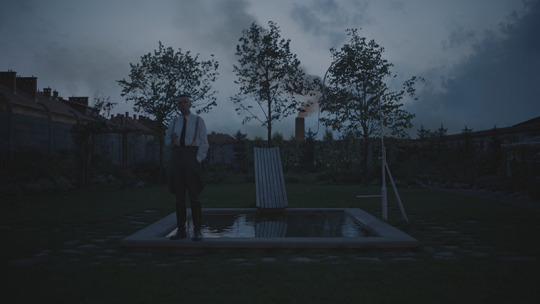

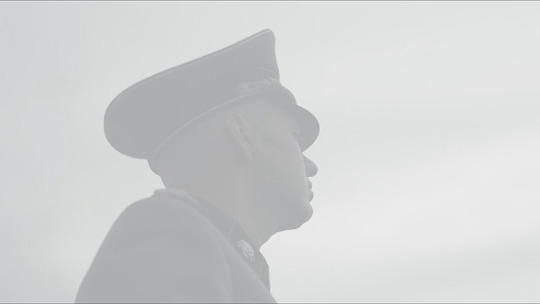

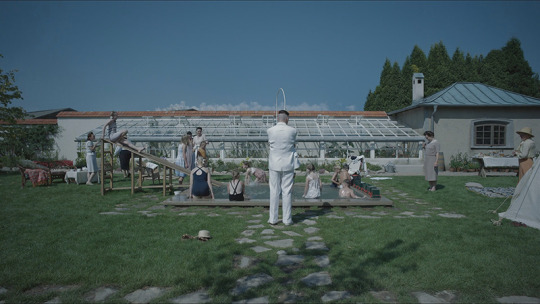

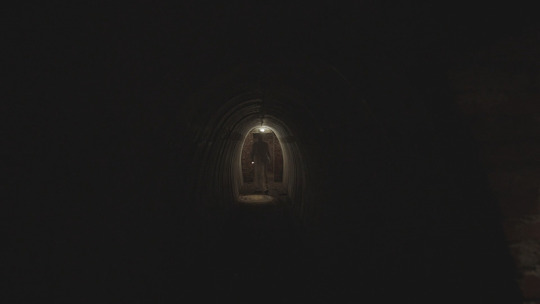
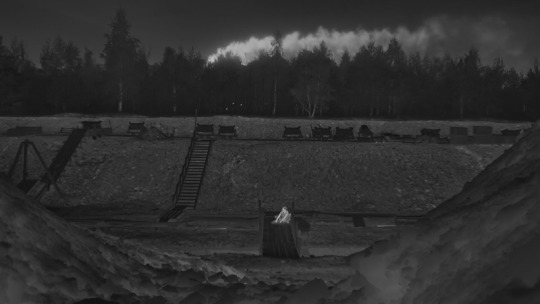
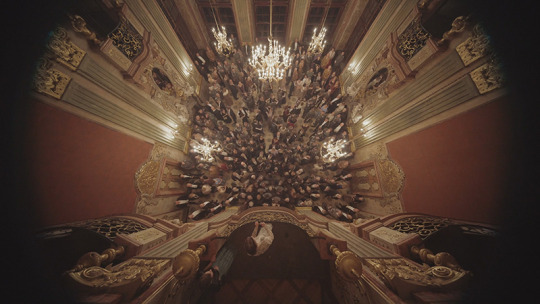
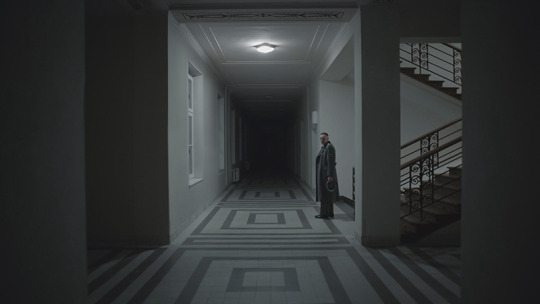
THE ZONE OF INTEREST (Jonathan Glazer, 2023)
Cuando vi esta película por primera vez en el Festival Internacional de Cine de Gijón, inmediatamente se me vinieron a la cabeza obras como 2001: A Space Odyssey o There Will Be Blood. ¿Qué motivos impulsaron a Jonathan Glazer a tomar decisiones formales tan arriesgadas? ¿Por qué ese arranque? ¿Por qué esa obertura? Quizá, de una forma paradójica y alegórica, se pretende enfatizar la idea de que las imágenes que otorgan entidad a la película intentan rebelarse contra sí mismas para no ser mostradas. Resulta entonces imposible ignorar la figura de Claude Lanzmann y su memorable digresión en torno a la ética, la moral y la exposición de la infamia.
Dado que la película se filma desde el punto de vista de lo inconcebible, adopta un carácter observacional, flemático y ascético que, en ocasiones, podría disociarnos de la atrocidad y acercarnos a un escenario costumbrista y rutinario. Ahora bien, si el medio es el mensaje —tal y como afirmaba Marshall McLuhan— o, si se prefiere, la forma crea el contenido —deducción archiconocida de Chabrol en referencia al cine de Hitchcock—, entonces lo verdaderamente revelante y relevante para entender esta película se localizaría en el formato utilizado, así como en su óptica y sonoridad. Elementos que aluden de forma constante al contraplano que jamás se muestra y que, por ello, trasciende aún con mayor contundencia y hondura. Al otro lado de esos muros de contención quizá podríamos descubrir al miembro de los Sonderkommandos Saul Ausländer de la película de László Nemes pero, en The Zone of Interest, la materialización fílmica de esa evocación se nos muestra en formato negativo, habitando un terreno aparentemente ilusorio cuya transmutación en realidad se consuma cuando la narración retorna a los quehaceres domésticos y mundanales que viabilizan la preservación del punto de vista heterodiegético.
Aquellos que hayan leído la novela en que se basa se habrán percatado de que Jonathan Glazer tan solo la utiliza como punto de partida, si bien es cierto que para con algunas de sus escenas funciona perfectamente como subtexto de acompañamiento. Martin Amis ficciona una trama y la sitúa en un momento histórico determinado. La película, sin embargo, se aleja de este enfoque, lo que permite que incida con mayor profundidad en su condición empírica y cáustica.
Los momentos en que la pantalla se satura por completo de colores elementales, incorporan fugaces instantes de reflexión ante unas imágenes que supeditan sus formas de arte y representación a la realidad misma que las fundamenta. Esta explicitación articula la parte emocional. La inverosímil y admirable composición musical de Mica Levi converge con el material filmado para convulsionar el relato y el ideario subyacente. Es aquí donde volvemos a la intersección de una disonancia inarmónica que se superpone a ciertos sonidos y situaciones sumidas en la más absoluta cotidianidad. Por otro lado, la ceremonia litúrgica que abre y cierra la película entre tinieblas, el blanco cegador despojado de su pureza o el rojo sangre como encarnación de lo abominable, serían ejemplos paradigmáticos de este aparataje sensitivo.
En su parte final, Rudolf Höss nos devuelve la mirada y desdibuja la línea temporal que se había mantenido hasta ese momento. Jonathan Glazer se transforma entonces en un pseudodocumentalista para mostrarnos imágenes recientes del Museo de Auschwitz y la película nos recuerda que ninguna situación pasada, presente ni futura debería permitirnos tomar distancia ante determinados sucesos que fueron, son y serán.
En el año 2019 Jonathan Glazer filmó un cortometraje basándose en la obra El sueño de la razón produce monstruos de Goya y, en él, anticipa buena parte de este planteamiento. Los personajes de esta pieza de cámara ocultan sus rostros y cuerpos bajo disfraces, de lo cual se puede inferir que cualquiera de nosotros podría ser uno de ellos. Llegados a este punto, quizá no resulte tan sencillo obviar la ignominia que nos rodea.
Se trata de una mera coincidencia, pero tras asistir a la proyección de la película estuve leyendo la novela Stella Maris de Cormac McCarthy. De su pluma y de la mente esquizofrénica del personaje de Alicia Western surgió de repente un pasaje que rápidamente identifiqué como una derivación de lo que había visto en pantalla. Es este:
"Coges una serie de imágenes fijas y las pasas en tándem a una determinada velocidad ¿y qué es eso que parece la vida misma? Nada más que una ilusión. ¡Anda! ¿Y qué es eso? Bah, qué importa si así haces que vuelvan los muertos. Lógicamente ellos no tienen gran cosa que decir. ¿Qué quieres? Llame antes de excavar. Habrá quien piense que el truco está en encontrar la pista de alguna realidad colateral. Por si no pillas la falacia implícita. La pertinente malicia. Puedes aportar vectores nuevos, aunque eso no es señal de que vayan a funcionar. ¿Te parece una buena idea? ¿Y si la gente quiere volver?
La gente no puede volver.
Así me gusta. La gracia está en que nunca vas a tener una pantalla en blanco. Y por supuesto lo que cuenta no es lo que se ve sino quién lo puso allí. Si en un momento dado miras y no hay nada en la pantalla ya lo pondrás tú misma, por qué no"
#the zone of interest#la zona de interes#jonathan glazer#christian friedel#sandra huller#ralph herforth#max beck#marie rosa tietjen#sascha maaz#stephanie petrowitz#lilli falk#freya kreutzkam#ralf zillmann#imogen kogge#nele ahrensmeier#johann karthaus#daniel holzberg#medusa knopf#luis noah witte#christopher manavi#zuzanna kobiela#julia polaczek#wolfgang lampl#film#cine
6 notes
·
View notes
Text
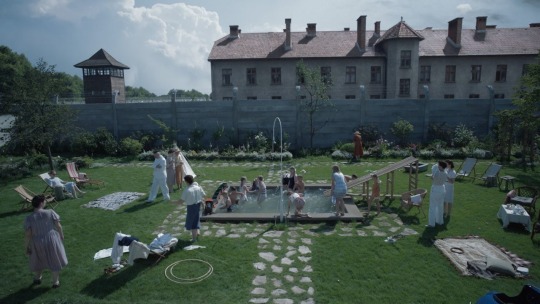
The Zone of Interest (2023, United Kingdom/Poland)
Over the last decade, English director Jonathan Glazer questioned whether it was appropriate for him to make a Holocaust movie from a Nazi perspective. Glazer, who comes from a Jewish family in north London, said that his family never spoke about the Holocaust at home, but it nevertheless loomed over their lives. His late father, when learning about Glazer’s decision to adapt Martin Amis’ novel The Zone of Interest, expressed disapproval. Yet Glazer forged ahead, his vision now complete.
I am no expert in the area of Holocaust cinema (of which there is a growing and always-controversial history) and do not profess to be a specialist of the Holocaust or Nazism. Nevertheless, I do believe it is possible to make a moral Holocaust narrative film from a Nazi point of view. Does Glazer succeed in doing so? That is a question that still perplexes me, and I am not sure if I can provide any satisfying answer. Given Glazer’s moral agonizing while making and within the visuals of this film, I am not sure if he knows either. So while I will still attempt to engage with the morality of The Zone of Interest (which, by many accounts, resembles little of Amis’ novel), this write-up’s premise will concentrate on two of the film’s goals as stated by Glazer himself.
The first is to immerse the viewer into the psychologies of Auschwitz concentration camp commandant Rudolf Höss (Christian Friedel; Rudolf Höss was the longest-serving commandant of the camp) and his wife, Hedwig (Sandra Hüller), and understand how their mindset is similar to how the viewer compartmentalizes modern-day atrocities. In these respects, Glazer succeeds. Just. Secondly, Glazer, “wanted to remove the artifice of filmmaking” in order to make as natural a film as he could, so that the audience can pay stricter attention to what is occurring on-screen. This is where The Zone of Interest falters.
It is 1943 in Nazi-occupied Poland. The Höss family lives in an estate just outside the walls of Auschwitz. Some days, the five children and their parents spend a lazy outing at a nearby riverbend, swimming and enjoying nature. At home, the Höss parents shield their children from the ugliness of the Second World War and the mass human suffering occurring just beyond the walls of the camp next door. Hedwig’s perfectly manicured garden, replete with flowers for decoration and herbs for cooking, is her escape – a world without wants. A small pool in the spacious backyard provides the children plenty of swim time. On a clear day, we can see the smoke stacks of an approaching train in the distance, soon to drop off its passengers to a place worse than hell itself. At night, Auschwitz’s crematorium spews an unearthly red – piercing the sky and sneaking past the drawn curtains of the Höss estate. And at all hours, we hear gunfire and screaming emanating from inside the camp.
Never do cinematographer Łukasz Żal’s (2014’s Ida, 2018’s Cold War) cameras show any glimpses of life within Auschwitz’s walls. None of the human suffering wrought by the Nazis appears directly in the film. We have a fleeting glimpse, obscured by foliage and for purposes unclear, of chained prisoners walking outside the camp’s walls under military escort. In another moment in the Höss household, a female prisoner comes to Rudolf Höss’ office for what is presumed to be forced sex; we never see or hear from her again, as we witness him wash his genitals (filmed from his backside) after their encounter. The particulars of what the Nazis did to the inmates of Auschwitz and the other concentration camps is for another film, Glazer says, a self-admission that he cannot hope to capture that suffering in narrative or documentary form. The decision not to show any Holocaust cinema has precedent, as seen in Claude Lanzmann’s documentary Shoah (1985, France) – largely seen as the 566-minute magnum opus of Holocaust cinema.
Instead, Glazer is more interested in something that has become a cliché in all writings on The Zone of Interest – what philosopher Hannah Arendt deemed the “banality of evil” – in order to allow modern audiences understand their own complicity in contemporary atrocities. Writing on the 1960 trial of Adolf Eichmann (one of the crucial facilitators of the Holocaust) in Israel, Arendt’s definition of the “banality of evil” stemmed from her subject’s lack of ideological fanaticism towards Jews, coupled with his inclination towards professional progression if it meant not having to think critically about any moral issues tied to said progression.
Arendt’s definition of the “banality of evil” has been controversial ever since the publication of 1963’s Eichmann in Jerusalem – a common accusation that Arendt was trying to diminish the severity of Eichmann’s guilt (she was not). Controversies aside, The Zone of Interest, on a cinematic surface, adopts that same “banality of evil”. The Höss parents never engage in explicit anti-Semitic language or refer to Auschwitz’s inmates as subhuman. Though Rudolf washes his genitals after the presumed sexual encounter with the prisoner and Hedwig seems uneasy when going through the luxury clothes of incarcerated/deceased camp inmates, life otherwise appears normal. In a scene where Rudolf is meeting with a private contractor on a more efficient crematorium system, both Rudolf and the contractor speak not with genocidal terms, nor carefully-worded innuendos. Instead, their meeting covers only the mechanics of the proposed system, in numbers and cold engineering efficiency. Without the historical context of The Zone of Interest, that discussion might eerily fit in a plain industrial meeting (not so much a later meeting with other concentration camp commandants as they discuss an imminent influx of Hungarian Jews to their camps).
To what lengths can a person accept the rationalizations of a leadership bent on the mass slaughter of innocent people on an industrial scale? Similarly, how does one reckon with their ostensibly peaceful existence when that peace is made possible only by revolting violence just a stone’s throw away? For these questions, we never receive any answers from anybody in the Höss family or their associates depicted within this film or from history itself. They live life without examining themselves, with no hints of regrets.
With the Höss parents not providing potential answers, it then turns to the viewer to ask themselves those same questions. I do not wish to come off as a youth-basher, but younger (American) viewers will need additional context for this film, if generational rates of Holocaust denialism are to be believed. For the rest of us, can we imagine ourselves turning a blind eye or going about our daily lives knowing that our happiness rests on the oppression, subjugation, or mass murder of a people? What do you share, personally, with Rudolf and Hedwig Höss? Does The Zone of Interest, in reaction to popular Hollywood Holocaust dramas of the 1990s and 2000s (see: 1993’s Schindler’s List, 2002’s The Pianist), paint the Holocaust as a non-unique event? This is a provocative work from a filmmaker who, in the absence of a grander narrative or intentional moralizing in his work, turns all of the introspection onto the audience. Beyond that, the film in and of itself is ideologically hollow.
The other half of Jonathan Glazer’s aims for The Zone of Interest was to create a film with minimal cinematic artifice. Łukasz Żal’s unobtrusive compositions and mostly-still camera certainly help in this regard, but too often some of the interior shots of the Höss household appear as if they are coming from the corners of the room, like anachronistic security camera footage. Most anachronistic of all are the black-and-white scenes in night vision for exterior shots of a young girl leaving apples around workplaces at Auschwitz. How jarring that the most humanistic moments of The Zone of Interest appear in the most visually artificial scenes of the film. The use of a night vision camera broke whatever hold The Zone of Interest had on me, cinematically. It comes off as a needless artistic flourish, as if to impress a captive audience.
Worst of all is Mica Levi’s horrific and unlistenable score. The score, for the ten to fifteen minutes it plays (hardly a score given a 106-minute runtime), is an atonal howler that shares a close relationship with the sound mix* – to the point where numerous other film critics have conflated the two. If Glazer is attempting to dissociate his film from the artifices of cinema, I cannot think of a better encapsulation of how quickly he fails than with this collaboration with Levi. In a time when many directors are telling their composers that they do not want noticeable music (in most instances, a fundamental misunderstanding about the dramatic and emotional capabilities of film music), Levi’s score is inescapable. Its heavy sonic distortions; complete dismissal of any familiar intonation (one of Levi’s primary influences is experimental composer Harry Partch, whose music obliterates the familiar seven pitches of a diatonic scale in favor of a 43-tone scale with uneven intervals); and bizarre use of electronically-manipulated choral screaming (a kitschy musical decision that borders on the insensitive and tasteless) might perfectly set the tone for some viewers. For myself – especially the scenes shot in night vision and the moment the screen fades to red – it was a discordant distraction that, again, only served to take me out of the movie.
The best film scores have several disparate but heavily interdependent and coequal qualities: they empower, but not overtake, the comedic/dramatic and emotional power of a movie and its narrative (if a narrative is present); they should typify exemplary musicianship (in composition and performance); and the viewer should be able to hear the music. Levi and Glazer share the failure on the the first two aspects. It is only on this third aspect that Mica Levi’s work truly contributes to The Zone of Interest – a film that would be better treated without a score.
The Zone of Interest raises pertinent questions of culpability and human responsibility in reckoning with humanity at its worst. There are moments in here – mostly scenes in which the reality of the Holocaust leaves its terrible shadow over the Höss family, moments where you expect them to possibly recoil from what they are doing – that stick with me, and haunt my ruminations over how I rationalize living in a society built on violence. Crucially, The Zone of Interest is not unique in inspiring such thoughts in a person, as some are suggesting. Martin Scorsese’s Killers of the Flower Moon (2023) and Steve McQueen’s 12 Years a Slave (2013) also provoked a similar introspection in me – these films depict two episodes within the context of the two original sins of my home nation. And though neither of those films centralize the goodness of others (far from it), if one looks close enough, one can find the banality of good (amid more naturalistic filmmaking).
In the end, Jonathan Glazer’s treatment of The Zone of Interest buckles underneath the weight of his promise to forego the conventions of art cinema. His objectives conflict with the artistic trappings – in its cinematography, music, sound mix, and an intellectual remove from human nature that I am unsure is appropriate for this subject matter – found within. It leaves his promise utterly broken.
My rating: 5/10
^ Based on my personal imdb rating. My interpretation of that ratings system can be found in the “Ratings system” page on my blog. Half-points are always rounded down.
* You hear nearly everything in this film. Sometimes, a little too perfectly. There are several moments in The Zone of Interest in which you hear the screams of Auschwitz’s prisoners or gunshots and they sound as if they are far too close to the Höss household than they should be. It reminded me, to paraphrase Larry Mantle on the December 15, 2023 episode of FilmWeek, of stage plays using off-stage tapes to play sounds for activities ostensibly not occurring "on stage". While that might work in a stage play, that is not the sort of comparison I wish to be making when writing on a film.
For more of my reviews tagged “My Movie Odyssey”, check out the tag of the same name on my blog.
#The Zone of Interest#Jonathan Glazer#Christian Friedel#Sandra Hüller#Ralph Herforth#Daniel Holzberg#Sascha Maaz#Martin Amis#Łukasz Żal#Paul Watts#Mica Levi#Tarn Willers#Johnnie Burn#A24#31 Days of Oscar#My Movie Odyssey
2 notes
·
View notes
Text
Living next door to Auschwitz
"Living next door to Auschwitz", a review of 'The Zone of Interest', a film directed by Jonathan Glazer.
DOES it suit me? Hedwig Hoess (Sandra Huller) tries on the fur coat of a murdered stranger, in The Zone of Interest directed by Jonathan Glazer.
WHAT WOULD YOU tell your children if you lived next door to hell? While they ramble through their idyllic garden and live their perfect life, how would you explain the occasional screams of abject terror uttered by strangers, in the night, or the…
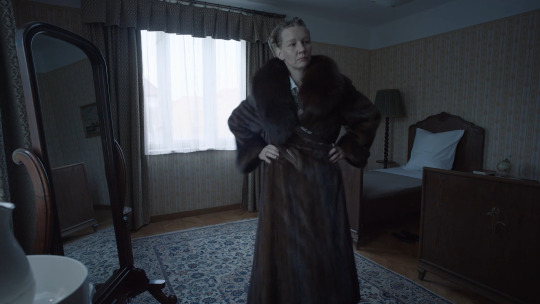
View On WordPress
#Alexandra Montag#Anastazja Drobniak#Andrey Isaev#Auschwitz#Auschwitz Oratorium#banality of evil#Cecylia Pekala#Chris Oddy#Christian Friedel#Cinema Nouveau#Daniel Holzberg#Ewa Puszczynska#Freya Kreutzkam#German#Germany#Hannah Arendt#Holocaust#Imogen Kogge#Jacqueline Rietz#James Wilson#Johann Karthaus#Jonathan Glazer#Julia Polaczek#Kalman Wilson#Krzysztof Penderecki#Lilli Falk#Luis Noah Witte#Lukasz Zal#Malgorzata Karpiuk#Martin Amis
2 notes
·
View notes
Text

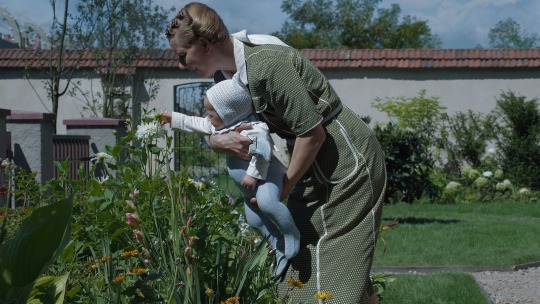

The Zone of Interest
2023. Historical Drama
By Jonathan Glazer
Starring: Christian Friedel, Sandra Hüller, Ralph Herforth, Daniel Holzberg, Sascha Maaz, Freya Kreutzkam, Imogen Kogge, Johann Karthaus, Lilli Falk, Nele Ahrensmeier, Luis Noah Witte, Kalman Wilson, Anastazja Drobniak, Cecylia Pekala...
Country: United States, United Kingdom, Poland
Language: German, Polish, Yiddish
#The Zone of Interest#Jonathan Glazer#Christian Friedel#Sandra Hüller#Ralph Herforth#Daniel Holzberg#Sascha Maaz#Freya Kreutzkam#Imogen Kogge#Johann Karthaus#Lilli Falk#Nele Ahrensmeier#Luis Noah Witte#Kalman Wilson#Anastazja Drobniak#Cecylia Pekala#United States#United Kingdom#Poland#German#Polish#Yiddish#2023#2020s#Drama#History
0 notes
Text

THE ZONE OF INTEREST 2023
The heartfelt time we spent in the Höss house will always be among our most beautiful holiday memories. In the East lies tomorrow. Thanks for your National Socialist hospitality.
#the zone of interest#2023#christian friedel#sandra hüller#ralph herforth#daniel holzberg#sascha maaz#freya kreutzkam#imogen kogge#johann karthaus#lilli falk#nele ahrensmeier#luis noah witte
0 notes
Text

CINE
La Zona de interés (2023)
Título original: The Zone of Interest
Reino Unido
Dirección: Jonathan Glazer
Idioma: Alemán con Subtítulos en Español
Atención: Solo para ver en PC o Notebook
Para ver el Film pulsa el Link:
https://artecafejcp.wixsite.com/escenario-cafejcp/post/la-zona-de-interes-2023
Reparto: Sandra Hüller, Christian Friedel, Ralph Herforth,
Daniel Holzberg, Sascha Maaz, Freya Kreutzkam, Imogen Kogge
Género: Drama | Holocausto. II Guerra Mundial.
Sinopsis: El comandante de Auschwitz Rudolf Höss y su esposa Hedwig se esfuerzan en construir una vida de ensueño para su familia en una casa con jardín cerca del campo.
Críticas:
"Una obra maestra construida al pie del abismo (…) Glazer compone, cuadro tras cuadro de una luminosidad y precisión admirable, la más atinada representación de la nada."
-Luis Martínez: Diario El Mundo
"Extraordinaria (…) ilustra con exquisito rigor la banalidad del mal."
-Sergi Sánchez: Diario La Razón
Posición en rankings FA:
34 Ranking de películas de 2023
134 Mejores películas y series sobre la Segunda Guerra Mundial
Premios:
2023: Premios Oscar: 5 nominaciones inc. mejor película y dirección
2023: Festival de Cannes: Gran Premio del Jurado
2023: Asociación de Críticos de Los Angeles: Mejor película, dirección, actriz y bso
2023: Premios Globos de Oro: 3 nominaciones
2023: Premios BAFTA (Reino Unido): 3 premios. 9 nominaciones
2023: Premios del Cine Europeo (EFA): Mejor sonido. 6 nominaciones
Café Mientras Tanto
jcp
0 notes
Text
Stella. Ein Leben. (2023)
Stella. Ein Leben. (2023)
#KilianRiedhof #PaulaBeer #JannisNiewoehner #KatjaRiemann #DamianHardung #LukasMiko
Mehr auf:
Stella. A Life. / Last Song for Stella Jahr: 2023 (November)
Genre: Drama / Kriegsfilm
Regie: Kilian Riedhof
Hauptrollen: Paula Beer, Jannis Niewöhner, Katja Riemann, Damian Hardung, Lukas Miko, Joshua Seelenbinder, Rony Herman, Benjamin Morik, Daniel Holzberg, Nikolai Will, Robin Sondermann, Bekim Latifi, Ulrich Schmissat, Roland Silbernagl, Sebastian Barnstorf …
Filmbeschreibung: Die junge…
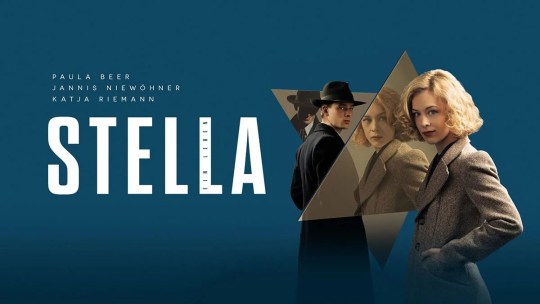
View On WordPress
1 note
·
View note
Text
The Venus Figurines' "Modern Paradigm": A Masterstroke of Alternative Rock
Crafting a masterstroke that simultaneously pushes boundaries and shows respect towards the traditions, The Venus Figurines’s sophomore album, “Modern Paradigm”, is a daring assertion of the band's musical dexterity and conceptual depth. The four-piece outfit originating from nipaluna/Hobart, lutruwita/Tasmania, shakes the poetic dust off alternative rock, revealing an exciting and versatile sonic landscape ripe for exploration.
https://open.spotify.com/album/41Y2MdDZmKqhAzljIIWolH
Frontman Jaidyn Daniels’ stirring vocals and commanding guitar work, Brad Holzberger’s pulsating drums, Cameron Quinn’s flexible and resonant guitar, and Angus Wilks’ firm bass guitar serve as pillars around which the strikingly insightful narrative of 'Modern Paradigm' wraps itself. Their chemistry is palpable and their individual talents sharpened to a razor edge, setting the stage for a multi-dimensional musical experience.
This album is eclectic and authentic, with a refreshing sound that challenges the listener. The opening track sets the tone with its intricate guitar work, punchy rhythm section, and raw vocals. The album is a confluence of melodies and lyrics that stick to the soul.
[caption id="attachment_51328" align="alignnone" width="2000"] The Venus Figurines' "Modern Paradigm": A Masterstroke of Alternative Rock[/caption]
Lyrically, the album is a triumph. A mirroring of the human life cycle, there are peaks of love, hope, and self-realisation, and troughs of loss, abuse of power and toxicity, creating a poetic rollercoaster ride. The bands ability to express these universal experiences with a sometimes triumphant, sometimes melancholic, but always authentic lens exemplify the semi-abstract lyricism that elevates this album from an auditory experience to an empathetic journey.
The lyrics, simultaneously presenting ambiguity with precision, resonate with listeners, forcing introspection and igniting discussions. It’s not just a song, but an uncensored conversation wrapped in compelling melodies.
Robyn Maddox’s “Midnight-15”: A Journey of Self-Discovery
"Modern Paradigm" is an aural feast and emotional journey that connects and speaks to listeners through its eloquent narratives and breathtaking melodies. Representing life's cycles, love's sweetness, and loss's pangs, it's more than just a song collection by The Venus Figurines - it's a multi-genre alternative rock exploration of human emotions. Its eclectic sound structure, profound lyricism, and the band's unified execution forecast a bright future for both the band and their genre.
In conclusion, The Venus Figurines’ “Modern Paradigm” is a node connecting musical pedigree with inventive creativity, the lyrical depth with thematic variety, and the joy of listening with the thrill of interpreting. It's a testament to their outstanding growth since forming in autumn 2015 and an innovative beacon lighting the path to their exciting future journey.
Follow the group on Facebook, Twitter, YouTube and Instagram.
#Music#ModernParadigm#ModernParadigmbyTheVenusFigurines#ModernParadigmfromTheVenusFigurines#ModernParadigmTheVenusFigurines#TheVenusFigurines#TheVenusFigurinesdropsModernParadigm#TheVenusFigurinesModernParadigm#TheVenusFigurinesoutwithModernParadigm#TheVenusFigurinesreleasesModernParadigm#TheVenusFigurineswithModernParadigm#TheVenusFigurinesModernParadigmAMasterstrokeofAlternativeRock
0 notes
Text
Thấy ông chủ ân cần sửa thiết bị báo cháy trong phòng mình, nữ giúp việc sinh nghi rồi phát hiện bí mật bệnh hoạn
Tờ New York Post mới đây đưa tin về vụ kiện giữa một nữ giúp việc và chủ nhà của cô về hành vi không đàng hoàng. Dù mọi chuyện vẫn chưa thực sự ngã ngũ nhưng dư luận đang đổ dồn sự chú ý của cô gái trẻ ngoại quốc này và cho rằng pháp luật cần bảo vệ quyền lợi cho cô.
Kelly Andrade, 25 tuổi, là cô gái trẻ đến từ Colombia. Trong hồ sơ gửi tòa án, Kelly đã kể tường tận hoàn cảnh của mình rằng cô đã trải qua hàng trăm giờ đào tạo làm bảo mẫu trước khi chính thức được trở thành nhân viên của công ty chuyên giới thiệu việc làm Cultural Care Au Pair. Công ty này đã sắp xếp đưa cô sang Mỹ và giới thiệu cô vào làm giúp việc trong căn nhà trị giá 800.000USD (hơn 18 tỷ đồng) bên bờ biển Tottenville, trên đảo Staten. Căn nhà này thuộc sở hữu của cặp vợ chồng Michael Esposito và Danielle.

Hình ảnh Kelly Andrade, 25 tuổi.
Thông qua phiên dịch viên, Kelly cho biết cô xem công việc này là cơ hội để trau dồi tiếng Anh, cũng như được làm việc ở Mỹ. Vợ chồng nhà Esposito cũng đối xử tốt bằng cách sắp xếp cho cô gái trẻ một phòng ngủ riêng, sống cùng nhà với chủ.
Tuy nhiên, sau một thời gian ngắn ở trong ngôi nhà này để trông giữ 4 đứa trẻ, Kelly đã phát hiện ra bí mật bệnh hoạn của ông chủ nhà.
Kelly cảm thấy nghi ngờ khi thấy chủ nhiều lần vào phòng mình, làm ra vẻ đang chỉnh sửa thiết bị báo cháy trên trần nhà.

Tên Michael Esposito bị tố quay lén.
Chỉ sau 3 tuần làm việc, Kelly quyết định tự mình kiểm tra thiết bị báo cháy và phát hiện camera quay lén. Cô gọi điện cho ông chủ để nói về phát hiện của mình và ông ta tỏ vẻ giận dữ, lập tức phóng xe về nhà trong vài phút. Ông ta đập cửa phòng và yêu cầu Kelly mở cửa nhưng cô giả vờ đang ngủ rồi trèo qua phía cửa sổ đến thẳng đồn cảnh sát, không quên mang theo chiếc thẻ nhớ lấy từ camera quay lén. Cô lo sợ ông chủ sẽ tấn công mình bằng súng nên đã kiên quyết không mở cửa.
Đơn kiện tuyên bố chiếc thẻ nhớ lấy từ camera chứa hàng trăm cảnh quay cho thấy Kelly đang khỏa thân hoặc cởi quần áo.
Cô nói với tờ New York Post: "Sau tất cả những gì vừa xảy ra, bây giờ tôi không có nơi để ở, tôi đang ở một đất nước hoàn toàn xa lạ. Tôi cô độc. Tôi không có tiền, tôi không biết mình sẽ ăn gì, không biết mình sẽ làm gì vào ngày mai". Những trải nghiệm đau đớn này đã khiến cô có ý định tự tử.
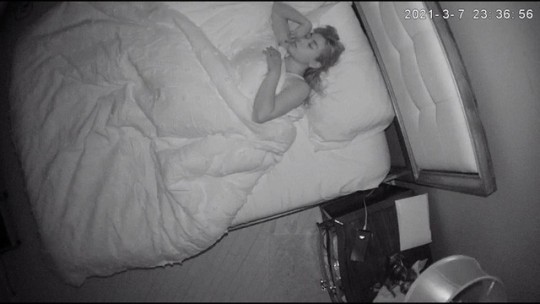
Một hình ảnh có trong camera quay lén trong phòng ngủ của Kelly.
Ngày 24/3 vừa qua, tên Michael Esposito đã bị cảnh sát bắt giữ. Sau khi hắn bị bắt, luật sư của hắn đã phủ nhận tất cả cáo buộc.
Luật sư Joseph Sorrentino của Michael Esposito nói với SILive.com: "Bất kỳ camera nào được lắp đặt trong nhà riêng của thân chủ tôi cũng đều vì mục đích an ninh. Đây là nhà riêng của thân chủ tôi, nơi anh ta sống cùng gia đình và có nhiều camera an ninh khác".
Nhưng những hình ảnh được các luật sư của Kelly công bố dường như cho thấy vợ chồng Esposito còn nằm ngủ và ngồi trên giường của cô. Tên Michael Esposito phải đối mặt với cáo buộc giám sát người khác bất hợp pháp nhưng hắn đã được thả tự do.
Luật sư của Kelly công bố hình ảnh cô ngủ say trên giường, trích xuất từ camera quay lén, cho rằng quyền riêng tư đã bị xâm phạm. Cô cũng khởi kiện công ty Cultural Care vì đưa mình đến môi trường làm việc nguy hiểm và có dấu hiệu phân biệt đối xử.
“Chúng tôi cho rằng Cultural Care phải có trách nhiệm với sự an toàn của cô ấy”, luật sư của kelly, Zachary Holzberg nói.
PV
Adblock test (Why?)
Nguồn https://ift.tt/3lXN6Te
0 notes
Text
The Comey Rule Trailer 2, Trumps lower Loyalty
New Post has been published on https://filmreviewonline.com/2020/09/22/the-comey-rule-trailer-2-trumps-lower-loyalty/
The Comey Rule Trailer 2, Trumps lower Loyalty
Here is The Comey Rule Trailer 2. We thought after our recent article by our Los Angeles editor you might like check it out. Should be a much talked about show.
The two-part mini series is based on the book that former FBI Director James Comey wrote after being fired in the first year of President Donald J Trump term.
The Comey Rule Trailer 2
youtube
The Comey Rule Lowdown
The mini series is based on Comey’s No 1 New York Times bestselling book A Higher Loyalty. In addition producers also did more than a year of additional interviews with a number of key principals.
The Comey Rule is an immersive, behind-the-headlines account of the historically turbulent events surrounding the 2016 presidential election and its aftermath, which divided a nation. The mini series is not a biopic of one man, but is instead the story of two powerful figures, Comey and Trump. Here we see how their strikingly different personalities, ethics and loyalties put them on a collision course.
Jeff Daniels and Brendan Gleeson star as former FBI Director James Comey and President Donald J Trump.
The Comey Rule Airdates
You can watch the premiere on Sunday September 27th, 2020 at 9/8c on Showtime. The second episode is on Monday 28th at the same time. Streaming is available from their apps just after midnight on the 27th.
The Comey Rule – Poster: Jeff Daniels as James Comey and Brendan Gleeson as President Donald Trump ©2020 CBS Television Studios / Showtime, photo by Ben Mark Holzberg
You can check out our Comey Rule interviews article here.
0 notes
Text
The Comey Rule trailer: Brendan Gleeson’s Donald Trump demands ‘loyalty’
The Comey Rule trailer: Brendan Gleeson’s Donald Trump demands ‘loyalty’
Written by Anvita Singh
| New Delhi |
Published: August 24, 2020 8:07:17 pm


Irish actor Brendan Gleeson as Donald Trump in the new show The Comey Rule.
(Photo: BEN MARK HOLZBERG/CBS TELEVISION STUDIOS/SHOWTIME)
The first trailer for the two-part series The Comey Rule is out. It features Jeff Daniels in the role of former FBI…
View On WordPress
0 notes
Text
The Comey Rule trailer: Brendan Gleeson’s Donald Trump demands ‘loyalty’
The Comey Rule trailer: Brendan Gleeson’s Donald Trump demands ‘loyalty’
Written by Anvita Singh | New Delhi | Published: August 24, 2020 8:07:17 pm

Irish actor Brendan Gleeson as Donald Trump in the new show The Comey Rule. (Photo: BEN MARK HOLZBERG/CBS TELEVISION STUDIOS/SHOWTIME)
The first trailer for the two-part series The Comey Rule is out. It features Jeff Daniels in the role of former FBI director James Comey and Irish actor Brendan Gleeson as US…
View On WordPress
0 notes
Text
Venus Figurines Showcases Superiority With 'Holiday'
In 2015 two college friends Jaidyn Daniels and Brad Holzberger discovered their love for music and decided to come together and start a band in Southern Tasmania, they later welcomed Cameron Quinn and Angus Wilks to the band and since then Venus Figurines has gained traction in Southern Tasmania, and continues to expand their wings.
Listening to songs of Venus Figurines one could hear the sound of different musicians like Foo Fighters, The Smashing Pumpkins, Deep Purple, The Dirty Nil, and Violent Soho this isn’t surprising because the band is heavily influenced by them/
Their latest single ‘Holiday’ opens with come explosive guitar riffs then accentuated with rhythmic drums that pave way for the magic incoming. Holiday is off the band's forthcoming album, Modern Paradigm which is expected to be out in the middle of 2023.
"Holiday" is taken from a person's perspective where they are undervalued and taken advantage of in a workplace where their superiors line their pockets whilst living the high life at the expense of their underlings who are less fortunate. - Venus Figurines
Listening to Holiday feels Nostalgic, the instruments which were used makes the lyrics of the song stand out while giving music lovers something to jam to. The song gives fans a sneak peek of what to expect from the band's sophomore album.
The band's outstanding amity and musicianship are on full display in the hard-hitting garage rock song "Holiday," which has killer guitar riffs, fuzzy melodic bass lines, and groovy percussion. Jaidyn Daniels - vocals, guitar | Brad Holzberger - drums, percussion | Cameron Quinn - guitar, backing vocals | Angus Wilks - bass guitar
Listen to Holiday below:
Follow Venus Figurines on
Facebook
Twitter
Spotify
Bandcamp
Youtube
Instagram
Songkick
#Music#ALTERNATIVEROCK#ANTHEMIC#AUSTRALIANBASED#GARAGEROCK#HARDROCK#holiday#HOLIDAYBYVENUSFIGURINES#MALEVOCALS#ROCK#SUPERCATCHY#VENUSFIGURINES#VENUSFIGURINESHOLIDAY#VENUSFIGURINESLATESTSINGLE#VENUSFIGURINESSINGLE
0 notes